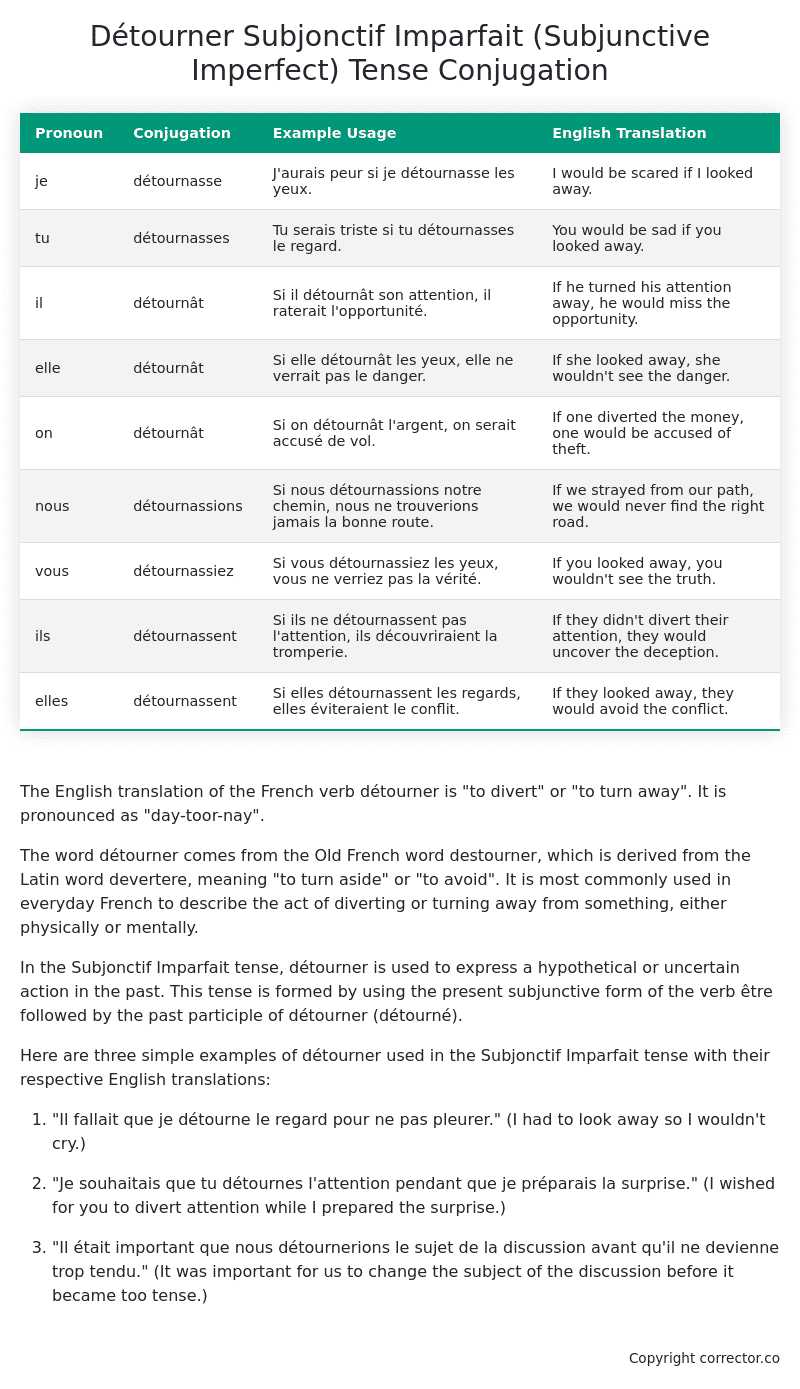Subjonctif Imparfait (Subjunctive Imperfect) Tense Conjugation of the French Verb détourner
Introduction to the verb détourner
The English translation of the French verb détourner is “to divert” or “to turn away”. It is pronounced as “day-toor-nay”.
The word détourner comes from the Old French word destourner, which is derived from the Latin word devertere, meaning “to turn aside” or “to avoid”. It is most commonly used in everyday French to describe the act of diverting or turning away from something, either physically or mentally.
In the Subjonctif Imparfait tense, détourner is used to express a hypothetical or uncertain action in the past. This tense is formed by using the present subjunctive form of the verb être followed by the past participle of détourner (détourné).
Here are three simple examples of détourner used in the Subjonctif Imparfait tense with their respective English translations:
-
“Il fallait que je détourne le regard pour ne pas pleurer.” (I had to look away so I wouldn’t cry.)
-
“Je souhaitais que tu détournes l’attention pendant que je préparais la surprise.” (I wished for you to divert attention while I prepared the surprise.)
-
“Il était important que nous détournerions le sujet de la discussion avant qu’il ne devienne trop tendu.” (It was important for us to change the subject of the discussion before it became too tense.)
Table of the Subjonctif Imparfait (Subjunctive Imperfect) Tense Conjugation of détourner
| Pronoun | Conjugation | Example Usage | English Translation |
|---|---|---|---|
| je | détournasse | J’aurais peur si je détournasse les yeux. | I would be scared if I looked away. |
| tu | détournasses | Tu serais triste si tu détournasses le regard. | You would be sad if you looked away. |
| il | détournât | Si il détournât son attention, il raterait l’opportunité. | If he turned his attention away, he would miss the opportunity. |
| elle | détournât | Si elle détournât les yeux, elle ne verrait pas le danger. | If she looked away, she wouldn’t see the danger. |
| on | détournât | Si on détournât l’argent, on serait accusé de vol. | If one diverted the money, one would be accused of theft. |
| nous | détournassions | Si nous détournassions notre chemin, nous ne trouverions jamais la bonne route. | If we strayed from our path, we would never find the right road. |
| vous | détournassiez | Si vous détournassiez les yeux, vous ne verriez pas la vérité. | If you looked away, you wouldn’t see the truth. |
| ils | détournassent | Si ils ne détournassent pas l’attention, ils découvriraient la tromperie. | If they didn’t divert their attention, they would uncover the deception. |
| elles | détournassent | Si elles détournassent les regards, elles éviteraient le conflit. | If they looked away, they would avoid the conflict. |
Other Conjugations for Détourner.
Le Present (Present Tense) Conjugation of the French Verb détourner
Imparfait (Imperfect) Tense Conjugation of the French Verb détourner
Passé Simple (Simple Past) Tense Conjugation of the French Verb détourner
Passé Composé (Present Perfect) Tense Conjugation of the French Verb détourner
Futur Simple (Simple Future) Tense Conjugation of the French Verb détourner
Futur Proche (Near Future) Tense Conjugation of the French Verb détourner
Plus-que-parfait (Pluperfect) Tense Conjugation of the French Verb détourner
Passé Antérieur (Past Anterior) Tense Conjugation of the French Verb détourner
Futur Antérieur (Future Anterior) Tense Conjugation of the French Verb détourner
Subjonctif Présent (Subjunctive Present) Tense Conjugation of the French Verb détourner
Subjonctif Passé (Subjunctive Past) Tense Conjugation of the French Verb détourner
Subjonctif Imparfait (Subjunctive Imperfect) Tense Conjugation of the French Verb détourner (this article)
Subjonctif Plus-que-parfait (Subjunctive Pluperfect) Tense Conjugation of the French Verb détourner
Conditionnel Présent (Conditional Present) Tense Conjugation of the French Verb détourner
Conditionnel Passé (Conditional Past) Tense Conjugation of the French Verb détourner
L’impératif Présent (Imperative Present) Tense Conjugation of the French Verb détourner
L’infinitif Présent (Infinitive Present) Tense Conjugation of the French Verb détourner
Struggling with French verbs or the language in general? Why not use our free French Grammar Checker – no registration required!
Get a FREE Download Study Sheet of this Conjugation 🔥
Simply right click the image below, click “save image” and get your free reference for the détourner Subjonctif Imparfait tense conjugation!

Détourner – About the French Subjonctif Imparfait (Subjunctive Imperfect) Tense
Formation
Common Everyday Usage Patterns
Interactions with Other Tenses
Subjonctif Présent
Indicatif Passé Composé
Conditional
Conditional Perfect
Summary
I hope you enjoyed this article on the verb détourner. Still in a learning mood? Check out another TOTALLY random French verb conjugation!


